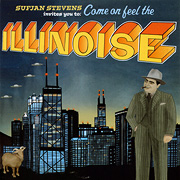
Illinois
Sufjan Stevens
2005: Asthmatic Cat AKR 014
This is so astonishing that I can barely think of anything to say about it.
A serious full commentary on this album will have to wait until I’ve had time to research its true genesis, but this much I can say right away: this is deeply moving, intensely evocative, fascinatingly derivative, painfully intimate, alienatingly familiar in a regional sense to an outsider…above all, this is music that shines from within seemingly negligible bits of broken glass.
I could cry through “Chicago” for hours and never get enough of the catharsis that gushes through the recording—the melody, the structure, the exact choice of musical key and instruments—and above all the lyrics hand-deliver a mantra in the form of a cascade of tears with sunlight shining through. The effect is amazing when you can look at it with any distance, but for me even getting to an objective stance with it is a mighty struggle. It’s so beautiful, so incredibly beautiful….
That it’s followed by the devastating and musically simple “Casimir Pulaski Day” just adds to the awe I have for this Sufjan Stevens guy: to go from all that I just described into something that seemed to be a lost thread of genuine mid-’60s folk music telling a new heartbreaking story with a mix of new and old evocation, well it’s enough to make me beg for a pause so I can recover. And the last line is even more breathtaking.
The first time I heard music from this album was at my local pub (the have-I-said-they’re-FABulous-enough-yet? McMenamin’s, Queen Anne), and I was mesmerized…I remember making a quick note to myself that I needed to hunt down a copy of an album by a guy or group that sounded like Simon & Garfunkel meets Postal Service, with a nice lacing of Daniel Bélanger. That was just a reference to trigger my own musical awarenesses later if it was necessary, but it was an apt one.
The fourth track, about Gacy, is every bit as disturbing as it was clearly intended to be; I’ve never been much of an obsessor when it comes to crimes and particularly grisly/notorious ones at that, so the lyrics to this one forced me to get a quick education as to the story behind it, and of course I was triply aghast because of the electrifying poignancy Stevens’s lyrics give it. “Oh my God / Are you one of them?” sent waves of chills through me, with good reason. The closing stanza goes about fifty thousand steps further as it spins your perspective around 180° and turns poetic commentary into personal indictment that suggests that you replay that track and rethink what you just heard…leaving aside the actual murdering, do you do that too? (Oh what the hell, go for the gusto: savor the last few seconds with the continued immediacy of ragged breath and belated fumbling.)
“Jacksonville” has continued to grow on me, not least because of its banjo-and-electric-guitar interplay (which is in a zone somewhere between homey simplicity and “Deliverance”). The local references here aren’t easy to track and access, but the impressions become clearer (if not “clear”) after repeated listenings…still, the basis for the storyline that leads us in lyrically, well, it nags at the side of my mind, wanting to be known fully. That our narrator has been blinded by an army-related incident seems sure, but who? where? when? why? That he rides the train past Nichols Park “after dark” is sardonic given the story thus far, but who IS this? A fascinating portrait, if a frustratingly indefinite one.
Stevens’s lyrics are wonderfully crafted, with a dash of Gertrude Stein patterning that recurs and becomes palimpsest as words and melodies are seemingly repeated but slightly changed, so slightly that you begin to forget what the first version had sounded like. And threads of these lyrics and melodies seem to appear here and there throughout the album. The Cartesian simplicity of the presentation of some of these tunes is deceptive, as this is not a mural but rather a cinematic sequence of similar scenes. Not all tracks here are like that, mercifully (that would indeed be sensory overload), but there’s a certain kinship to all the tracks that naggingly makes me wonder if some of them aren’t just restructured versions of other tracks here.
No complaints, though. I’m seriously impressed.
(An afterthought: the banjo, vocals, and lyrics on “Casimir Pulaski Day” bring to mind the final scene of “Harold and Maude,” Harold plucking his banjo and skipping off into a changed life in the aftermath of the trauma of Maude’s death, although in the case of this song we’re still in the mourning.)
Comments © 2006 Mark Ellis Walker, except as noted, and no claim is made to the images and quoted lyrics.